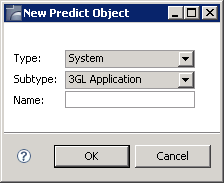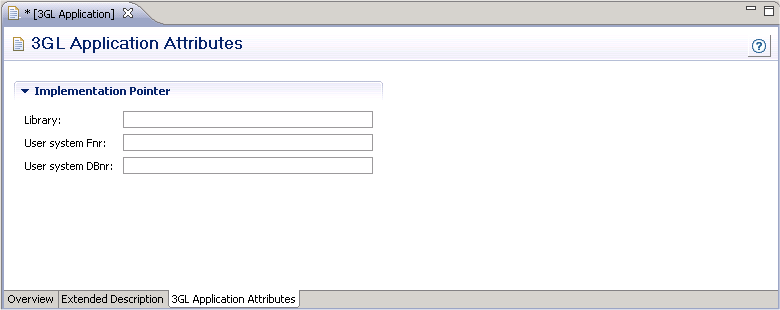An application can be documented with a Predict object of type System. See System Types for a list of possible system types.

This document covers the following topics:
For general information on how to manage objects (for example, how to add or copy an object), see the Predict Object Description documentation.
The table below contains a list of all valid system types.
| Code | System Type |
|---|---|
| A | Application Library |
| B | Base Application |
| C | Conceptual. Used to outline the preliminary description of an application in the design phase. |
| G | 3GL Application |
| O | Compound Application |
| P | DB2 plan. Used to document a DB2 application. |
When you add a system, you first have to specify the system type in the New Predict Object dialog box.

When you choose the button, a system type-specific window appears. The system type is indicated in the title bar. Different or sections with different names are used, depending on the system type:
Implementation Pointer section (3GL Application and Application Library)
DB2 Plan Attributes tab (DB2 Plan)
Base Application Attributes tab (Base Application)
For system types Compound Application and Conceptual only the tabs for the global attributes are provided.
The following is an example of the Implementation Pointer section.

Note:
Parameters not listed here are described under
Global
Attributes.
| Parameters | |||||||||
|---|---|---|---|---|---|---|---|---|---|
| Implementation pointer |
|
||||||||
| DB2 plan name | This information is shown on the DB2 Plan Attributes tab (type DB2 Plan). Unique DB2 plan name. | ||||||||
| Profile |
|
||||||||
| Port | This information is shown on the Base Application Attributes tab (type Base Application). The port number. | ||||||||
| Server name | This information is shown on the Base Application Attributes tab (type Base Application). The name of the server. | ||||||||
| Development platform | This information is
shown on the Base Application Attributes tab (type Base
Application). The development platform. Enter one of the following
values:
|
||||||||
Systems documented with Predict objects of type System can be identified with three parameters: library, file number and database number. The three possible combinations of these parameters are shown below.
| Library | Y | Y | Y |
| File number | Y | Y | |
| Database number | Y |
Predict objects of type System are purged with the command.
The following rules apply to this function:
A system of type A (Application Library) cannot be deleted if it is linked to one or more systems via association "Has library SY".
A system of type G (3GL application) cannot be deleted if XRef data exist.
The following objects are deleted:
the system object
all links to child objects
all links from parent objects
Use this function to change the ID and/or type of a system object. The following restriction applies:
You cannot change the type of a system of type 3GL application for which XRef data exists.
You cannot change the type of a system of type A (Application Library) if it is linked to one or more systems via association "Has library SY".